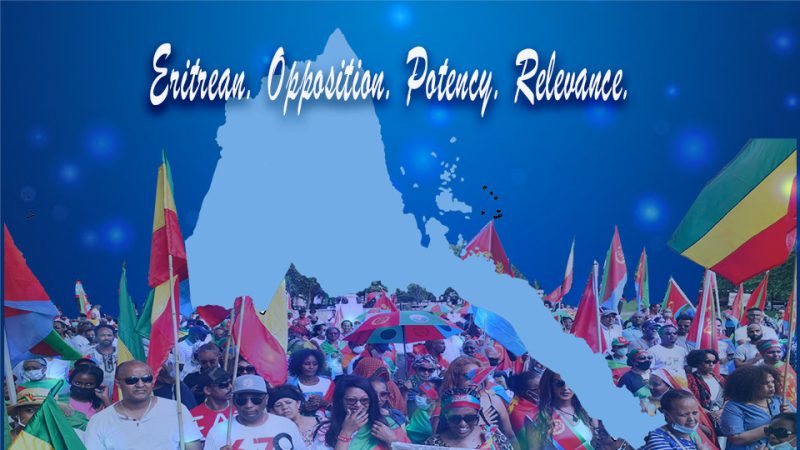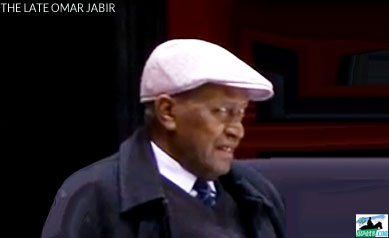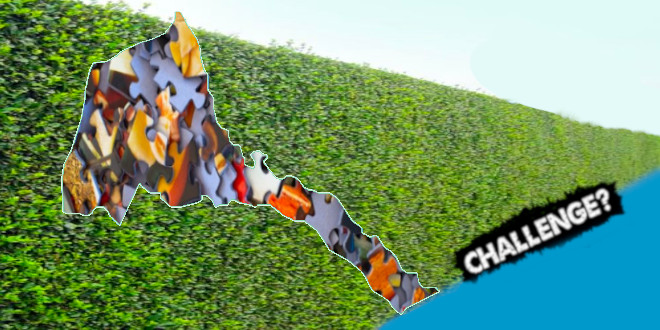Eritrean Opposition Movement: In Dire Search of Potency and Relevance

Whenever foreign journalists query Eritrea’s strongman, Isaias Afewerki about political opposition to his totalitarian rule, he is known to get a fake perplexed look on his face before retorting, in feigned puzzlement, “What opposition?” On further prodding from a persistent inquisitor, he tries to lay the question to rest with a dismissive, yet emphatic denial: “Eritrea does not have political opposition!” Ironically, there happens to be some truth in this seemingly preposterous statement.
Being the utterance of a dictator — whose guiding principle is “might makes right” and who contends that concerns like democracy, civil liberties, human rights, etc. are ‘petty diversions’ that distract from ‘weighty national priorities’ — the statement is apt to invite an angry rejection or a sarcastic ridicule from anti-regime entities. But upon calm reflection, it becomes obvious that the remark is not as absurd as it first sounds. One even begins to appreciate the ironic truths that the statement holds regarding the state of Eritrean anti-regime opposition inside the country and abroad.
A. Domestic Opposition: President Isaias Afewerki’s foremost preoccupation as a leader has been not the pursuit of national economic development and social progress, but the quest for absolute power in the country and political domination of the region. One of the vehicles his despotic regime devised for fulfilling this political ambition is a ruthless intelligence and security apparatus. By setting up this machinery, the regime has casted an elaborate, nationwide surveillance network on the population, thus enabling itself to nip in the bud any incipient opposition or resistance to its rule. Familiar outputs of these rule-of-terror spying and control have been the arrests and torture of actual or suspected dissidents, and the enforced disappearances of the most effective and/or prominent among them.
The regime continues to thwart potential youth-driven, pro-democracy civil unrest by forcibly conscripting young people into indefinite national/military service. This imposition, the regime’s unrelenting assault on civil liberties and the country’s moribund economy have combined to force hundreds of thousands of youth to flee the country and immigrate to other countries as refugees. With such draconian sociopolitical-control measures in place, it has been unthinkable for overt opposition to exist in the country. The Eritrean leader’s assertion is, thus, an accurate characterization of the political reality on the domestic front.
B: Diaspora Opposition: On the other hand – with the influx of refugees, exiles and defectors swelling their ranks – Eritrean diaspora communities were able to flourish in the liberal political climate of their adopted countries and out of the menacing reach of Isaias Afewerki’s brutal security establishment. In consequence, these communities turned into a hotbed of anti-regime activism that played critical roles both in initiating and advancing Eritrea’s opposition movement in exile. Efforts undertaken successfully in these regards include raising political awareness of diaspora Eritreans, fostering the creation of political groups abroad, as well as staging mass rallies and availing themselves of international forums to expose the cruelties of the regime and publicize the suffering of the Eritrean people under its brutal rule.
Despite their extensive and sustained political activism, however, diaspora opposition groups have so far proven incapable of kindling mass political action or otherwise helping shape a new political landscape in the homeland. Indeed, the sad reality that emerges from the movement’s history is that, in its more than 20 years of existence, diaspora opposition has not been able to shake loose, much less endanger, the regime’s stranglehold on the country. This fact points to the deficiencies and impotence of the opposition – factors which, undoubtedly, feed into the dismissive statements the dictator often makes regarding the opposition in general. Putting aside the egotistical proclivity of dictators to disparage their foes, it is intuitively self-evident that the real objective of the dictator’s statements is not so much to deny the existence per se of diaspora opposition as it is to discount its significance.
The State of Diaspora Opposition
The level of worries and concerns an authoritarian regime manifests about opposition to its rule gives a reality check on the potency of forces striving to bring it down. The Eritrean regime’s rhetoric and behavior regarding its national political adversaries suggest that it has never, at any time, considered the diaspora opposition as posing a serious and credible threat to its rule. Nevertheless, this does not, by any means, imply the regime is nonchalant or laid-back about guarding against such a threat. Indeed, the PFDJ government has, over the years, amply demonstrated its resolve to keep its military and intelligence establishments alert and ready to respond to possible danger from the opposition. Examples are the regime’s swift military response to occasional cross-border forays by armed insurgents and its intelligence agency’s relentless covert operations that target opposition groups abroad.
To stand a chance of prevailing over an authoritarian regime, a political opposition needs to have the capability of: presenting a formidable political challenge to the regime; mounting political attacks that put it on the defensive and/or leave it bruised; demonstrating to the international community – through vision, organization and performance – that the opposition offers a better alternative to the current regime; inspiring citizens to stand against injustice and mustering popular support. Unfortunately, Eritrea’s exiled opposition groups have to date fallen far short of developing such capabilities. PFDJ supporters and habitual fault-finders use this inadequacy as ammunition to belittle and malign the opposition movement. The rationally inquisitive, in contrast, are impelled by it to search for possible reasons. Such a search conducted for the benefit of this article has led to the identification of the following causative factors.
A: Organizational Weaknesses A striking feature of the Eritrean opposition movement is the plethora of political groups it has spawned over its 20 years of existence, numbering as many as 30 by some accounts! Amusingly, some are just small groupings of like-minded friends and acquaintances who deceptively label themselves as ‘opposition’ to advance their self-serving interests. To the writer’s knowledge, none of the rest has developed a comprehensive political program that articulates its vision for the country; a platform that details its principles, policies and positions on political issues; and a strategy that lays out clear mechanisms/procedures for implementation thereof. Instead, opposition groups have, in the main, organized themselves around some sketchy, generalized and hackneyed objectives of “bringing change” in the country and, in some cases, simply removing the current regime from power.
A political program and a base of political support are two fundamental elements of a political organization worthy of the name. The near absence of these elements in most diaspora opposition groups has not only inhibited constructive competition among themselves, but made it impossible to rank them based on effectiveness and the level of following they enjoy. The result has been an amorphous movement comprising an assortment of hard-to-differentiate groups each claiming political legitimacy based on nothing more than its own notion of self-worth.
Many of these groups have been in existence for years during which they experienced little or no growth in stature or capability and demonstrated hardly any innovation in approaches and tactics. Most run political activities that seldom go beyond issuing denunciations of the regime’s reprehensible practices, taking part in occasional anti-regime rallies and engaging in a backbiting/blaming game with each other.
B: Retrogressive, Accusatory Activism Eritrean diaspora intellectuals and veteran activists are looked upon with high hopes and expectations as a force capable of advancing the opposition movement to an eventual success. The commitment of most of these elites to the cause of democracy and justice and their dedication to the struggle for democratic change in Eritrea promise nothing less. However, some among them have lately drifted into a routine of reciting the regime’s crimes and cruelties – some recent, others decades old – and condemning its tyrannical ways. So much so they seem to be engrossed in such futile exercise to the exclusion of engaging in proactive measures that would push the struggle forward.
The PFDJ regime’s record of the past two decades leaves no doubt about its tyrannical nature. Many of its policies and practices on governance and on foreign relations have been the target of widespread and frequent international condemnations. Nothing is to be gained, therefore, by engaging in more of the same passive reaction to the evils of the regime. What is needed, instead, is intensification of the struggle through adoption of creative and flexible tactics/approaches appropriate to the region’s evolving geopolitical dynamics and shifting alliances.
C: Enemy Subversion The profusion within the movement of small, loosely-organized groups with apparent apathy toward mutual cooperation and little affinity for each other has rendered the movement vulnerable to enemy subversion. The PFDJ regime has been untiring in its clandestine operations to divide and weaken diaspora opposition. In addition, the Horn region is home to political entities which not only avow their aversion to Eritrea’s progress, but are actively hostile to its very existence as a nation-state. To serve their respective ambitions and interests and in pursuit of their political agendas, both hostile forces continue to exert sustained effort to infiltrate and undermine opposition groups, hence to paralyze the movement. Working secretly from within, their infiltrators and fifth-columnist collaborators spread misinformation, lies and hatred to incite political, ethnic, regional and religious tensions thereby fostering division, animosity and internecine fighting within and between groups.
D: Vitiation of the Movement Continued fragmentation of the movement has recently given rise to groups which claim to identify with the opposition movement, but pursue agendas antithetical to that of the mainstream opposition. Some of these groups have been urging predisposed Western powers and their client rebels in the region to invade Eritrea, remove the current regime and install a puppet government in its place; all while positioning themselves as the perfect candidate for that role. Others are working for the realization of the far-fetched dream of an entity in the region which aspires to end Eritrea’s existence as we know it, by causing its break-up and incorporating parts thereof into a new “Greater” country – a dream reminiscent of the delusion that fueled the disastrous “Greater Somalia” expansionist adventure of the 1970s!
There exists plenty of circumstantial evidence to indicate that both (i) the emergence of these opportunist groups and (ii) the agendas they are given to advocate are the product of machinations that the sponsoring external forces engineered against Eritrea’s constructive opposition and against Eritrea itself. This scheme constitutes perhaps the gravest threat external enemies ever posed to the movement. Its immediate objective is to split the opposition into multiple camps with conflicting agendas, pit them against each other, and subvert the struggle for democratic change.
Eritrea’s opposition movement was borne out of rational patriotism and had a mission of instituting justice and democracy in a nation secure in its sovereignty and territorial integrity and content with the unity and harmony of its people. In the past 2-3 years, however, the public image of the Eritrean Justice and Democracy Movement (EJDM) has been tarnished and its political integrity undermined by the emergence, from within its ranks, of opportunist groups that have placed themselves at the service of expansionist and neocolonialist interests. The treasonous alliances forged, rhetoric expressed and activities engaged in by these groups have polluted and debased the EJDM by distorting and sullying its true cause and vision.
The Way Forward
Ensuring progress in the struggle for justice and democracy in Eritrea requires that the opposition remove, as a matter of urgency, the problems and weaknesses enumerated above. As can be inferred from the foregoing analysis, the measures that should be taken to solve the identified problems are, in theory, pretty straightforward. However, their actual implementation would be daunting, if not impossible, under the confusingly messy state in which the opposition movement presently finds itself.
As its external sponsors intended, the subversive scheme they hatched against the struggle has succeeded in fomenting recrimination, mistrust, dissension, hostility and division within the opposition – effectively throwing the entire movement into disarray. Luckily, the two-year period of disruption and political confusion that ensued seems to be drawing to a close. Rising above the chaos, factions of independent and progressive elements of the opposition are presently regrouping across localities and regions intent on making a new beginning and charting a course forward for a reformed movement. Such a reform process should necessarily entail, among other things, taking the following critical steps:
- Cleansing the movement of subversive elements by exposing opportunist groups for who they really are: Hired guns mindless of the death and devastation that would be visited on their homeland by the very foreign aggression they have been recruited to advocate.
- Restoring political integrity of the opposition movement and authenticity of its mission.
Through effective outreach and mobilization efforts of its constituent groups, the reformed movement should strive to win the support of the majority of the population inside the country – the final arbiters of the nation’s best interest. Armed with the power that such support bestows, the movement should fight the treasonous agenda of opportunist groups with the same grit, dedication and tenacity that it must apply to its struggle against the regime’s despotic rule.
Independent-minded and progressive elements constitute a significant portion, if not the majority, of the opposition camp. But, even if they do not, the success of the movement will ultimately depend not on the number of activists and followers, but on their commitment and dedication to the cause. After all, as the old dictum has it, “revolutions are won by a tiny percentage of the populations who benefit from them.”




Awate Forum